Chapter 1
The city was a living, breathing entity, its pulse thrumming through the veins of skyscrapers and sidewalks alike. Henry Patterson had always been a part of that rhythm, a cog in the machine that never stopped turning. At 26, he was the picture of urban success: a real estate agent with a growing portfolio, a gym membership he used religiously, and a meticulously curated routine that kept his life in perfect balance. His green eyes, often described as piercing, scanned the skyline from his 14th-floor apartment, the morning light catching the golden strands of his thick, blonde hair. He ran a hand through it, feeling the coarseness of his beard-another testament to his rugged, disciplined lifestyle. Henry was a man who prided himself on control, on order. But lately, the city's pulse felt less like a heartbeat and more like a suffocating grip.The burnout had crept in slowly, like a shadow stretching across the pavement at dusk. It wasn't just the long hours at the office or the endless client meetings. It was the weight of expectations, the constant pressure to perform, to close deals, to be the best. Henry had always thrived under pressure, but now it felt like the walls of his world were closing in. His morning runs no longer cleared his mind, and the clang of weights at the gym felt more like a chore than a release. He was starting to wonder if this was all there was-a life of spreadsheets, handshakes, and hollow victories.
Then, the letter arrived.
It was a plain envelope, the kind that didn't belong in the sleek, modern mailbox of his apartment building. The return address was unfamiliar, a small town in the South he hadn't thought about in years. Inside was a single sheet of paper, the handwriting neat but shaky, as if the writer's hand had trembled with the effort. It was from a lawyer, informing him of his uncle David's passing and the subsequent inheritance of his farm. Henry stared at the words, his mind struggling to process them. Uncle David. His father's only brother, a man he hadn't seen since he was a child. A man who had always been more of a myth than a memory.
Henry's first instinct was to dismiss it. He had a life here, a career, a routine. But as the days passed, the idea of the farm lingered in his mind like a persistent itch. It wasn't just curiosity; it was something deeper, a longing for change, for escape. The city, once his playground, now felt like a cage. And so, against his better judgment, Henry made the decision. He would go to the farm, if only to see it, to satisfy the restless ache in his chest.
---
The drive south was a journey into another world. The city's skyline gave way to rolling hills and endless fields, the air growing heavier with the scent of earth and greenery. Henry's car, a sleek black sedan that had always felt like a symbol of his success, now felt out of place among the dirt roads and weathered barns. He followed the GPS until it led him to a wrought-iron gate, its hinges rusted but still standing tall. Beyond it stretched a vast expanse of land, the farmhouse a distant silhouette against the horizon.
Henry stepped out of the car, his polished shoes sinking into the soft earth. The farm was bigger than he had imagined, the fields stretching as far as the eye could see. He took a deep breath, the air thick with the scent of hay and something sweet, like ripe fruit. It was quiet, the kind of quiet that made his ears ring after years of city noise. He felt a strange mix of awe and unease, as if he had stepped into a dream he wasn't sure he wanted to be a part of.
As he approached the farmhouse, he noticed movement in the distance. Figures emerged from the fields, their shapes growing larger as they drew closer. Henry squinted, trying to make out the details. They were men, but unlike any he had ever seen. Each one was enormous, their bodies swollen to staggering proportions. Their overalls strained against their bulk, their faces round and flushed from the effort of walking. Henry's first thought was disbelief. Surely, this was some kind of joke. But as they came closer, their expressions serious, he realized this was no prank.
The largest of the men stepped forward, his belly swaying with each step. He was easily over 400 pounds, his face framed by a thick beard that did little to hide his double chin. He extended a hand, his fingers stubby but surprisingly strong.
"You must be Henry," he said, his voice deep and gravelly. "Name's Jonathan. We've been expectin' you."
Henry shook his hand, his own grip firm but hesitant. "Yeah, that's me. Henry Patterson. I, uh... I wasn't sure what to expect."
Jonathan chuckled, the sound rumbling like distant thunder. "I reckon not. Farm life's a bit different from the city, ain't it?"
Henry nodded, his eyes scanning the group. There were five of them in total, all similarly massive, their faces friendly but guarded. He couldn't help but notice how out of place he felt, his lean frame and tailored clothes a stark contrast to their bulk and worn overalls.
"So, uh... this is it?" Henry asked, gesturing to the farm. "This is my uncle's place?"
"Yep," Jonathan said, his tone matter-of-fact. "Your uncle David built this place from the ground up. Was the biggest man in these parts, in more ways than one."
Henry frowned, not sure he had heard correctly. "The biggest man?"
Jonathan nodded, a hint of pride in his voice. "Oh, yeah. Your uncle was a legend around here. Weighed in at 750 pounds, give or take. Strong as an ox, too. Could lift a hay bale like it was nothin'."
Henry's mind reeled. 750 pounds? That couldn't be right. He had vague memories of his uncle from childhood, but they were hazy, more impressions than clear images. He remembered a large man, sure, but not... not that large.
"You're kidding," Henry said, his voice tinged with disbelief. "There's no way."
Jonathan shrugged, his massive shoulders rolling like boulders. "See for yourself. His clothes are still in the house. Ain't no denyin' it."
Henry followed Jonathan to the farmhouse, his mind racing. The house was old but well-maintained, its wooden walls weathered but sturdy. Inside, the air was cool and smelled of wood smoke and something sweet, like molasses. Jonathan led him to a closet in the hallway, pulling open the door to reveal a row of overalls and shirts, each one enormous. Henry reached out, his fingers brushing against the fabric. It was thick and coarse, the seams stretched to their limits. He pulled out a pair of overalls, holding them up to his own frame. They dwarfed him, the waistline wide enough to fit three of him.
"See?" Jonathan said, his tone almost smug. "Told ya."
Henry stared at the overalls, his mind struggling to reconcile the image of his uncle with the reality before him. "But... how? I mean, how does someone even get that big?"
Jonathan chuckled again, his belly shaking with the effort. "Food's good down here, son. Real good. Men get fat in the South 'cause there ain't no reason not to. Life's slower, simpler. You eat, you work, you enjoy yourself. Ain't no shame in it."
Henry shook his head, his disbelief giving way to something else-something like determination. "Well, that's not going to happen to me. I don't care how good the food is. I'm not going to end up like... like that."
Jonathan raised an eyebrow, his expression amused. "That's what they all say, son. But the South has a way of changin' folks. You'll see."
Henry didn't respond, his jaw tightening as he folded the overalls and placed them back in the closet. He wasn't like these men. He wasn't like his uncle. He had control, discipline. He wouldn't let this place change him.
But as he stepped back outside, the sun warm on his face and the fields stretching endlessly before him, he couldn't shake the feeling that he was standing on the edge of something much bigger than himself. The farm was more than just land; it was a legacy, a challenge, a mystery waiting to be unraveled. And whether he liked it or not, Henry was a part of it now.
The question was, how far was he willing to go to find out what that meant?
Henry stood in his uncle's office, a room that felt like a time capsule from another era. The walls were lined with shelves crammed with ledgers, receipts, and stacks of paper that seemed to have been untouched for years. A large oak desk dominated the center of the room, its surface cluttered with more paperwork, a dusty typewriter, and a framed photograph of a younger Uncle David, his broad smile and even broader frame frozen in time. Henry ran a hand over the desk, feeling the grooves and scratches that spoke of decades of use. He pulled out the chair, its leather cracked but still sturdy, and sat down.
The first ledger he opened was a revelation. The numbers were staggering. His uncle hadn't just been a farmer; he had been a businessman, a shrewd and meticulous one at that. The farm's profits were astronomical, far beyond what Henry had expected. There were records of crop yields, livestock sales, and even investments in local businesses. His uncle had diversified his assets, turning the farm into a financial empire. Henry's eyes widened as he flipped through the pages, his mind racing with the implications. This wasn't just a farm; it was a goldmine.
He spent hours poring over the ledgers, cross-referencing numbers and piecing together the story of his uncle's success. The more he read, the more he realized how little he had known about the man. Uncle David had been a visionary, a man who saw potential where others saw only dirt and toil. He had built something extraordinary, something that Henry now had the responsibility of managing. The weight of that responsibility settled on his shoulders, but it was accompanied by a flicker of excitement. This was a challenge, a puzzle to solve, and Henry had always loved a good puzzle.
As the afternoon light began to fade, Henry leaned back in the chair, his mind buzzing with ideas. He could modernize the farm, streamline operations, maybe even expand. The possibilities were endless. But first, he needed to understand the day-to-day workings of the place. He needed to talk to the workers, to see the fields, to get his hands dirty. He was about to close the ledger when a knock at the door interrupted his thoughts.
"Henry?" Jonathan's voice called from the hallway. "Dinner's ready. Mark's been cookin' up a storm."
Henry frowned, glancing at his watch. He hadn't realized how late it had gotten. "Thanks, Jonathan. I'll be right down."
He closed the ledger and stood, stretching his stiff muscles. As he made his way downstairs, the smell hit him like a wave. It was rich, savory, and impossibly inviting, a blend of spices and aromas that made his mouth water before he even reached the kitchen. He followed the scent, his stomach growling in anticipation.
The dining room was a sight to behold. The table was laden with dishes, each one more extravagant than the last. There were platters of fried chicken, golden and crispy, bowls of creamy mashed potatoes, steaming pots of collard greens, and a mountain of cornbread that looked like it could feed an army. At the center of it all was a massive roast, its juices pooling on the platter beneath it. Henry stared, his mind struggling to process the sheer volume of food.
"Well, don't just stand there," Jonathan said, his voice laced with amusement. "Dig in."
Henry hesitated, his eyes scanning the table. "This is... a lot. I mean, I don't usually eat this much."
Jonathan chuckled, his belly shaking with the effort. "You're in the South now, son. We don't do small meals."
Henry glanced at Mark, who was standing by the stove, his massive frame barely contained by his overalls. The man was a mountain of flesh, his auburn hair sticking out in all directions, his beard wild and unkempt. His hands, thick and calloused, were still busy stirring a pot of gravy, his movements surprisingly graceful for someone of his size.
"Mark, this is incredible," Henry said, his voice filled with genuine admiration. "I've never seen anything like it."
Mark looked up, his eyes twinkling with pride. "Well, I aim to please. Your uncle always said my cookin' was the best part of the farm."
Henry couldn't help but smile. "I can see why."
He took a seat at the table, his plate quickly filled with a little bit of everything. The first bite of fried chicken was a revelation. The crust was perfectly crisp, the meat tender and juicy, the flavors exploding in his mouth. He closed his eyes, savoring the taste. It was unlike anything he had ever eaten, a symphony of flavors that left him craving more.
Before he knew it, his plate was empty, and he was reaching for seconds. The mashed potatoes were creamy and buttery, the collard greens tangy and smoky, the cornbread sweet and crumbly. Each bite was better than the last, the food so delicious it was almost addictive. Henry found himself eating more than he had in years, his usual restraint forgotten in the face of such culinary perfection.
Jonathan watched him with a grin, his own plate piled high. "See? Told ya. Mark's food'll do that to ya."
Henry laughed, his mouth full of cornbread. "I can't help it. This is amazing."
Mark chuckled, his deep voice rumbling through the room. "Well, guilty as charged. I've been known to pack on a pound or two with my cookin'."
Henry looked at him, then at Jonathan, and then at the other workers, all of whom were happily devouring their meals. He couldn't help but notice how large they all were, their bodies a testament to years of indulgence. For a moment, he felt a pang of unease, a flicker of the discipline that had always guided him. But then he took another bite of the roast, the flavors so rich and satisfying that all his doubts melted away.
"You know," Henry said, his tone light but thoughtful, "I can see why my uncle loved it here. This place... it's something else."
Jonathan nodded, his expression serious for once. "It is. And now it's yours. You'll see, Henry. The farm has a way of gettin' under your skin. Before you know it, you'll be one of us."
Henry laughed again, but there was a part of him that wondered if Jonathan was right. The farm was more than just land and money; it was a way of life, a world unto itself. And as he sat there, surrounded by good food and good company, he couldn't help but feel like he was on the brink of something big.
The morning after that feast, Henry woke with a heaviness he wasn't used to. His body, trained for efficiency and precision in the city, felt sluggish, as though it were processing more than just food-it was digesting the whole place, its strange rhythms and unspoken expectations. He dragged himself out of the narrow farmhouse bed, washed his face in the basin, and caught his reflection in the warped mirror on the wall. His jaw was still sharp, his eyes still bright, but there was a softness there-perhaps only in his mind-that hadn't existed before.
Downstairs, the smell hit him again. Bacon, eggs, biscuits, gravy. The scents clung to the air like perfume, impossible to ignore. In the kitchen, Mark and Jonathan were already seated, their plates overflowing. Another man Henry hadn't met yet-tall, balding, and with arms as thick as tree trunks-was ladling sausage gravy onto a biscuit with meticulous care.
"Henry! Sit, sit," Jonathan boomed. "Breakfast's gettin' cold."
Henry hesitated at the doorway. "I don't usually eat this heavy in the morning. Just coffee, maybe some oats."
The bald man turned his head slowly, almost incredulous. "Coffee and oats? Son, that ain't breakfast. That's starvin'."
Mark laughed, his laugh booming like rolling barrels. "Your uncle would've cuffed your ear if you said that to him."
Henry forced a smile, sliding into a chair. "Guess I'll have a little, then."
But "a little" wasn't really an option. Mark's heavy hand dropped eggs onto his plate, then bacon, then biscuits, gravy, fried apples. Every time Henry lifted his fork, someone added something else. By the time he took his third bite, Jonathan was pressing a slab of ham toward him.
"Gotta keep your strength up if you're to walk the land," Jonathan said, chewing noisily.
Henry wanted to refuse. He wanted to stand, to laugh it off, to say he'd eaten enough-but their eyes lingered on him, expectant and warm, and he couldn't bring himself to break that bond. After all, they were his uncle's men, his uncle's friends. He didn't want to be rude.
So he ate.
By the time he pushed his plate away, his stomach felt stretched, uncomfortably full. He loosened his belt under the table, praying no one noticed. They did.
"You're holdin' it in too much," said the bald man. "Name's Russell, by the way. You gotta learn to relax. Let the farm feed you."
Henry laughed awkwardly. "I'll, uh... keep that in mind."
Later, when the men drifted outside to tend to chores, Henry stayed behind in the farmhouse. The food had left him drowsy, and he moved slowly, wandering through rooms he hadn't yet explored. The house had a strange magnetism, each room more cluttered than the last, like a museum where the only exhibit was his uncle's life.
In a hallway lined with dusty portraits, Henry stopped. A frame caught his eye-not like the others, which showed the massive man he'd heard so much about, surrounded by pigs or leaning against tractors. No, this one was different.
It showed a young man in his twenties. His uncle.
But not the uncle Henry remembered.
This David was shockingly thin, with angular cheekbones and sharp elbows visible even through his collared shirt. His tie hung too loose, his smile stretched too wide, the face of a man too eager to please. His eyes were bright, though-alive, ambitious, almost hungry in another sense.
Henry stepped closer, studying it. His uncle looked... fragile. Vulnerable, even. Nothing like the colossal figure described at dinner the night before.
He felt the oddest chill.
How had this man-slight, almost boyish-become the mountain of flesh spoken about with reverence? The transformation seemed impossible, grotesque even. Yet the proof was here in his hands.
"Findin' somethin' interestin'?" Jonathan's voice broke the silence. He'd returned without Henry noticing, filling the narrow hallway with his bulk.
Henry turned the frame toward him. "This... is Uncle David?"
Jonathan's eyes softened. "That's him, yeah. Hard to believe, ain't it? He was wiry as a fence post when he came back from college. Didn't take long 'til he grew into himself, though."
Henry frowned. "Grew into himself? He was rail thin."
"Mm." Jonathan chuckled low. "The farm has a way of doin' that. Food here... it ain't just food. It's a kind of inheritance. You'll come to understand."
Henry set the photo back, unease prickling his skin. "That's not going to happen to me."
Jonathan smiled, but it wasn't unkind. "Son, that's what he said too."
The days that followed bled into each other, each marked by meals that never seemed to end. Breakfasts the size of feasts, lunches like banquets, dinners heavier than celebrations. Henry noticed a pattern: whenever he slowed his eating, someone would slide a dish closer, nudge his elbow, urge him on.
"Try the pie, Henry."
"Don't insult Mark-take another scoop."
"You're a Patterson. Pattersons eat hearty."
At first, Henry laughed it off, playing along. He didn't want to cause offense, didn't want to stand apart. But the more it happened, the stranger it felt. Their insistence wasn't casual. It was... pointed. Like they needed him to eat. Like feeding him wasn't kindness, but duty.
Late at night, lying in bed, Henry pressed his palm to his stomach, remembering the photo of the thin young man. His uncle's face, eager and hollow, hovered in his mind. He wondered at the path that photo didn't show-the decades between that wiry body and the colossal one described with awe.
Contemporary Fiction
Friends/Family Reunion
Mutual gaining
Pig/Cow/Hog
Humiliation/Teasing
Helpless/Weak/Dumpling
Feeding/Stuffing
Sexual acts/Love making
Addictive
Denying
Dominant
Helpless
Indulgent
Lazy
Spoilt
Male
Gay
Weight gain
Friends/Roommates
X-rated
3 chapters, created 3 months
, updated 3 months
21
2
4046

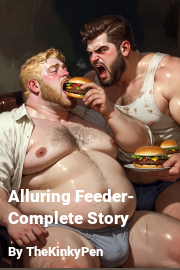
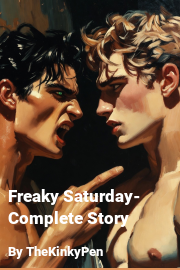
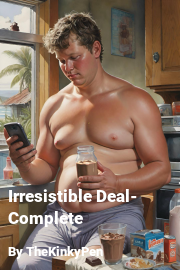
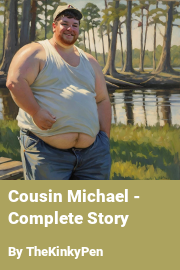
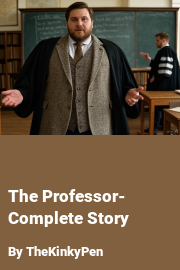

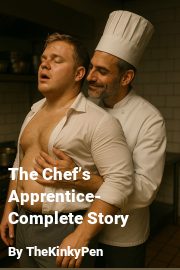

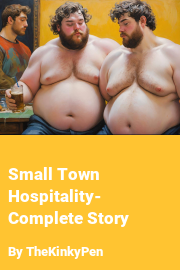

Comments